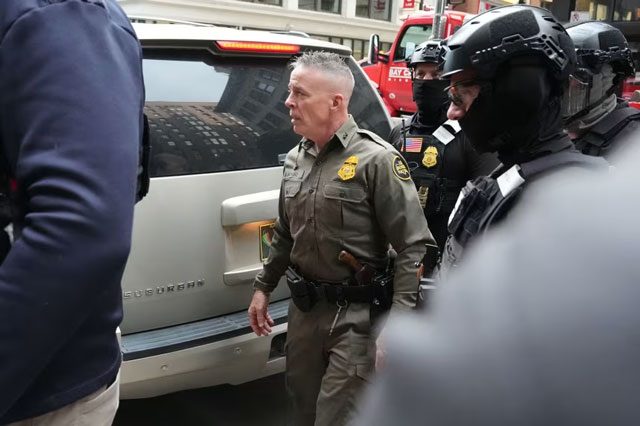Daijiworld Media Network - Chicago
Chicago, Oct 30: A tense legal battle is unfolding in Chicago as Border Patrol Commander Gregory Bovino prepares to face a five-hour deposition on Thursday in connection with a lawsuit challenging federal immigration enforcement tactics under the Trump administration’s “Operation Midway Blitz.”
The lawsuit, filed by protesters, journalists, and clergy members, accuses federal agents of using excessive force—including tear gas and pepper balls—against peaceful demonstrators outside the Immigration and Customs Enforcement (ICE) facility in Broadview, near Chicago.

Just a day before the scheduled deposition, the Seventh Circuit Court of Appeals issued a surprise order halting a directive from U.S. District Judge Sara Ellis, who had required Bovino to appear in court daily for a week to explain his agency’s actions.
The Justice Department argued that forcing a senior official to brief the judge every day would “significantly interfere” with immigration enforcement operations and cause “irreparable harm” to the government. The appeals court sided with the administration, granting temporary relief late Wednesday afternoon.
Bovino, the public face of Operation Midway Blitz, has defended his agency’s actions, insisting that rising hostility toward federal officers has forced them to adopt “necessary defensive measures.” The Department of Homeland Security (DHS) celebrated the ruling, calling it a “pause on judicial overreach.”
Since its launch in September, Operation Midway Blitz has resulted in over 3,000 arrests, according to DHS figures. But the operation has also triggered widespread protests in the Chicago area, with civil rights groups accusing federal agents of intimidating demonstrators and restricting press access.
Judge Ellis’s earlier restraining order barred agents from using tear gas or less-lethal weapons on protesters unless there was an “immediate threat to safety.” It also required officers to issue clear warnings before deploying such force and to wear visible identification and body cameras to document crowd control measures.
During a hearing earlier this week, Ellis expressed deep concern that her order was being ignored, citing video evidence allegedly showing federal agents firing tear gas without warning. “I do not want to see violation reports on Halloween where children are present and gas is being deployed,” she warned.
Meanwhile, Bovino, in an appearance on Fox News, maintained that his officers were working under “intense conditions of violence and provocation,” adding that he was willing to meet the judge “to show her what’s really happening on the streets of Chicago.”
The court has directed that all use-of-force reports and body camera footage from September 2 through last Saturday be submitted under seal by the end of this week. A hearing next week will determine whether Judge Ellis’s temporary restraining order should be extended into a long-term injunction—a ruling that could significantly impact federal immigration enforcement tactics in the region.
As Chicago braces for further demonstrations, the case has become a flashpoint in the broader national debate over federal authority, civil rights, and law enforcement accountability.